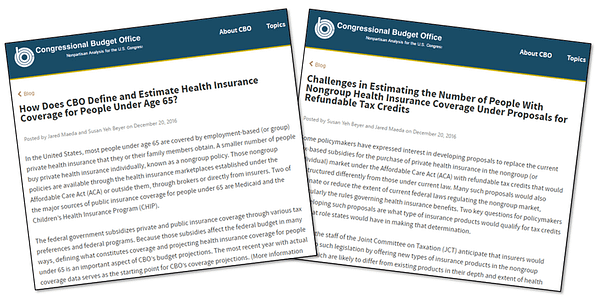CBO: GOP Health Care "Plans" May Not Count as "Insurance"
There is total chaos in the House of Representatives today as Speaker Paul Ryan rushes to jam through a version--any version--of his so-called American Health Care Act. The timing and the ever-changing content of the bill have little to do with health care for the American people and everything to do with political spite. Ryan wants to pass a bill by midnight Thursday in order to humiliate President Obama on the 7th anniversary of his signing of the Affordable Care Act.
But in their mad scramble to take health insurance away from 24 million people over the next decade (at last count), Speaker Ryan, President Trump and their GOP allies may have made yet another mistake. By gutting Obamacare's list of "essential health benefits" to win over the extremists of the House Freedom Caucus, Ryan's GOP health care "plans" may no longer meet the nonpartisan Congressional Budget Office definition of "insurance."

As Vox and The Hill among others have reported, Republicans are trying to reduce premiums by eliminating the ACA's list of 10 mandated benefits insurers must provide. These provisions regarding prescription drug coverage, hospitalization, out-patient treatment, mental health care, pregnancy and maternity care and much more not only set a baseline for insurance offerings under Obamacare, but also help spread the risk for insurers across a much larger pool of policyholders. And that, CBO warned Obamacare repealers in December, is a big problem as far as the agency is concerned:
CBO and the staff of the Joint Committee on Taxation (JCT) anticipate that insurers would respond to such legislation by offering new types of insurance products in the nongroup market, which are likely to differ from existing products in their depth and extent of health insurance benefits. If there were no clear definition of what type of insurance product people could use their tax credit to purchase, some of those insurance products would probably not provide enough financial protection against high medical costs to meet the broad definition of coverage that CBO and JCT have typically used in the past--that is, a comprehensive major medical policy that, at a minimum, covers high-cost medical events and various services, including those provided by physicians and hospitals...
If there were no clear definition of what type of insurance product people could use their tax credit to purchase, everyone who received the tax credit would have access to some limited set of health care services, at a minimum, but not everyone would have insurance coverage that offered financial protection against a high-cost or catastrophic medical event; CBO and JCT would not count those people with limited health benefits as having coverage.
For their part, CBO and the Joint Committee on Taxation (JCT) warned of the challenges they "would face in estimating the number of people who would purchase coverage in the nongroup market, and the scope of that coverage, under such proposals." Larry Leavitt of the Kaiser Family Foundation helped explain why. Under the new GOP rules, insurers would doubtless create new plans under which premiums would come down.
But on the flip side, he wrote, insurance plans could become very skimpy, because insurers would be wary of offering generous plans and attracting only sick, costly people who were willing to pay more for them.
"With no benefit requirements, insurance policies could get quite skimpy. No insurer wants to be the one most attractive to sick people," he wrote.
"With no required benefits, some (like mental health or maternity) would be very expensive because only people who need them would buy them," he added.
To predict the results, you only need to go back to the future.
Jeanne Lambrew, one of the White House architects of ObamaCare, earlier this year pointed to a Department of Health and Human Services report from 2011 that showed how plans have changed.
In 2011, the report showed that 62 percent of individual market plans did not cover maternity care, 34 percent did not cover substance abuse services, 18 percent did not cover mental health coverage and 9 percent did not cover prescription drugs.
As of this writing, it's unclear whether Paul Ryan's gambit will secure enough votes to pass the House. Even if it does, Senate moderates and Senate rules might still prevent this revised American Health Care Act from reaching President Trump's desk. But if it does, millions of Americans will lose health care coverage. Millions more will end up buying something that may or may not keep them physically, mentally and financially healthy. But however those plans are ultimately defined, the Congressional Budget Office warns, they can't be called "insurance."

